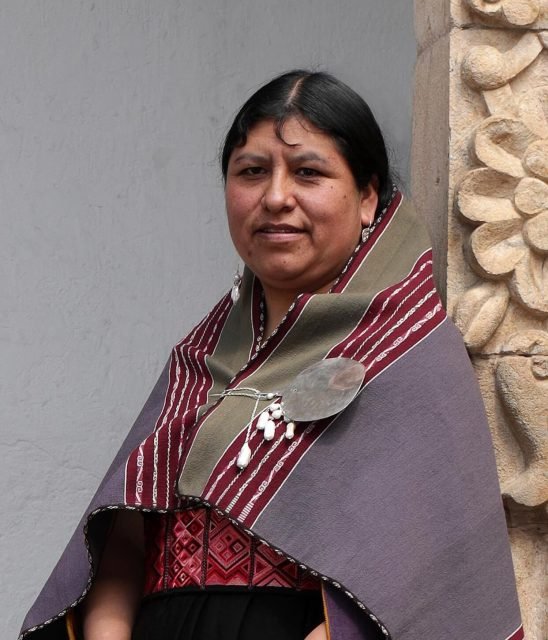
Elvira Espejo Ayca, Artist and Director, Museo Nacional de Etnografía y Folklore, La Paz, Bolivia
Elvira Espejo Ayca (1981) is a visual artist, weaver and narrator of the oral tradition of her place of origin. Born in Qaqachaka ayllu, Avaroa Province, Oruro Department, she is a speaker of both Aymara and Quechua. She is currently Director of the National Museum of Ethnography and Folklore (MUSEF) in La Paz. She is author of the publication Sawutuq parla [About Textiles] (2006), and the books of poems Phaqar kirki – T’ikha takiy – Canto a las flores [Song to the Flowers] (2006), for which she received the International Poetess Award at the 4th World Poetry Festival in Venezuela (2007), and Kaypi Jaqhaypi – Por aquí, por allá [This Way and That] (2018). She is co-author of Hilos sueltos: Los Andes desde el textil [Loose Threads: The Andes through Textiles] (2007), Ciencia de las mujeres: Experiencias en la cadena textil desde los ayllus de Challapata [Women’s Science: Experiences in the Textile Chain from the Ayllus of Challapata] (2010), Ciencia de tejer en los Andes: Estructuras y técnicas de faz de urdimbre [Weaving Science in the Andes: Warp-Face Structures and Techniques] (2012), El textil tridimensional: El tejido como objeto y como sujeto [Three-Dimensional Textiles: The Fabric as Object and Subject] (2013) and Tejiendo la vida: la colección textil del Museo Nacional de Etnografía y Folklore, según la cadena de producción [Weaving Life: The Textile Collection of the Museo Nacional de Etnografía y Folklore, La Paz, Bolivia, following the productive chain] (2013). In collaboration with Bolivian musician Álvaro Montenegro, she has produced the contemporary music DVDs Thakhi – La Senda. Canciones a los animales [The Path: Songs to the Animals] (2007) and Utachk kirki – Canto a las casas [Song to the Houses] (2011). Her awards include: the 1st Eduardo Avaroa Prize in Arts, specialising in Native Textiles, La Paz, Bolivia (2013); the 1st Prize for Fostering Native Creation in Literature, specialising in Poetry, as part of the 5th Arica Barroca South Andean Art Festival, Chile (2018), and the Goethe-Institut Medal (2020), awarded by the Federal Government of Germany for her valuable work as a cultural mediator between Latin America and Europe and between her own indigenous traditions and other cultures.